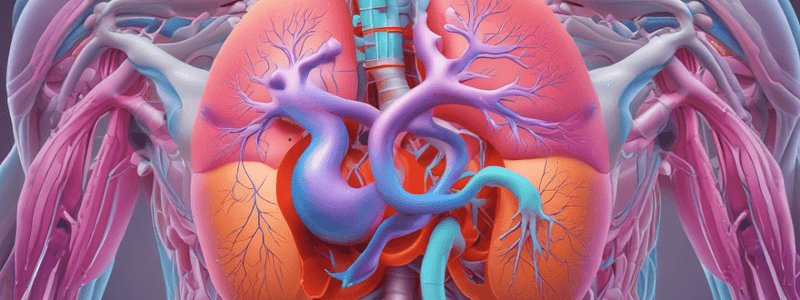Podcast
Questions and Answers
Which system is responsible for maintaining the appropriate heart rate and rhythm?
Which system is responsible for maintaining the appropriate heart rate and rhythm?
- Hematological system
- Immunological system
- Cardiovascular system (correct)
- Respiratory system
What is the function of the hematological system?
What is the function of the hematological system?
- Protects the body against infections
- Controls the heart rate and rhythm
- Regulates the breathing process
- Relates to blood and blood-forming tissues (correct)
Which system is responsible for protecting the body against infections and pathological organisms?
Which system is responsible for protecting the body against infections and pathological organisms?
- Immunological system (correct)
- Cardiovascular system
- Respiratory system
- Hematological system
What is the process of moving air in and out of the lungs called?
What is the process of moving air in and out of the lungs called?
What does the term 'aerobic capacity' refer to?
What does the term 'aerobic capacity' refer to?
What is the function of blood pressure?
What is the function of blood pressure?
Which of the following is NOT a function of the voice?
Which of the following is NOT a function of the voice?
What is required for speech to be understood by others?
What is required for speech to be understood by others?
Which system regulates hormone levels in the body?
Which system regulates hormone levels in the body?
What is the primary function of the urinary system?
What is the primary function of the urinary system?
Which of the following is NOT a function of the genital and reproductive systems?
Which of the following is NOT a function of the genital and reproductive systems?
What is the primary function of the skin?
What is the primary function of the skin?
Which system is responsible for breaking down and utilizing carbohydrates, proteins, and fats?
Which system is responsible for breaking down and utilizing carbohydrates, proteins, and fats?
What is required for activities that involve the chance of injury to the skin?
What is required for activities that involve the chance of injury to the skin?
Which of the following is NOT a function of the endocrine system?
Which of the following is NOT a function of the endocrine system?
Which system is responsible for food moving through the body and being absorbed and broken down?
Which system is responsible for food moving through the body and being absorbed and broken down?
Study Notes
Cardiovascular System
- The cardiac conduction system regulates heart rate and rhythm, involving specialized cells that initiate and propagate electrical impulses.
Hematological System
- The hematological system is responsible for transporting nutrients, gases, hormones, and waste products throughout the body, as well as playing a role in immune response.
Immune System
- The immune system protects the body against infections and pathogenic organisms, utilizing various cells and antibodies to identify and neutralize threats.
Respiratory System
- The process of moving air in and out of the lungs is called ventilation, consisting of inhalation and exhalation.
Aerobic Capacity
- Aerobic capacity refers to the maximum amount of oxygen that an individual can utilize during intense exercise, indicating cardiovascular fitness.
Blood Pressure
- Blood pressure is crucial for ensuring adequate blood flow to organs and tissues, facilitating nutrient and gas exchange and waste removal.
Voice Functions
- Non-verbal sounds, while important for communication, do not constitute a function of the voice, which primarily serves in verbal communication.
Speech Comprehension
- Clarity of enunciation and context are required for speech to be understood by others, ensuring effective communication.
Endocrine System
- The endocrine system regulates hormone levels in the body through glands that secrete hormones into the bloodstream, influencing various bodily functions.
Urinary System
- The primary function of the urinary system is to filter blood, remove waste products, and maintain fluid and electrolyte balance.
Reproductive Systems
- Non-reproductive biological processes, such as digestion, are not functions of the genital and reproductive systems, which focus on reproduction and sexual characteristics.
Integumentary System
- The primary function of the skin includes protecting internal organs, regulating temperature, and providing sensory information.
Digestive System
- The digestive system is responsible for breaking down carbohydrates, proteins, and fats, facilitating nutrient absorption through a complex process involving various organs.
Skin Injury Protection
- Protective measures, such as wearing appropriate gear, are required for activities that involve risks of injury to the skin.
Endocrine System Functions
- The endocrine system does not primarily manage responses to immediate environmental changes, which is the function of the nervous system.
Digestive and Absorption Processes
- The digestive system facilitates the movement of food through the gastro-intestinal tract, where it is broken down by enzymes and absorbed into the bloodstream.
Studying That Suits You
Use AI to generate personalized quizzes and flashcards to suit your learning preferences.
Description
Test your knowledge on body functions including cardiovascular, hematological, immunological, and respiratory systems. Also, examine functions related to voice and speech, digestive, metabolic, endocrine, genitourinary, reproductive systems, and more.



